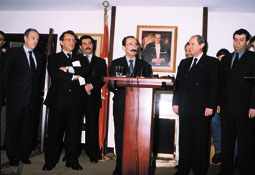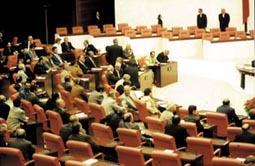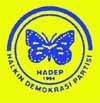5
July 2002
![]()
2. "Turkey: Ecevit's Illness Puts Reforms, EU Bid In The Balance", as calls urging Turkish Prime Minister Bulent Ecevit to resign intensify, the European Union is stepping up pressure on Ankara to proceed with legal reforms needed to qualify for membership. Many in Ankara believe the next few months will be crucial, not only for the future of the ruling coalition but also for Turkey's longtime dream of integrating into Western Europe.
3. "Turkish government vows to stick to economic programme, EU reforms", the Turkish government pledged Thursday to adhere to an IMF-backed programme to rescue the country from financial crisis and accelerate efforts to undertake controversial reforms required for EU membership.
4. "Parliament to meet on Sept. 3, diplomats in a serious pessimism", the Turkish Parliament is expected to meet on Sept. 3 for an extraordinary session, however, Turkish diplomats are in a serious pessimism that the existing government and the Parliament will be able to fulfill the expectations of the European Union (EU).
5. "Turkish court grants amnesty to pro-Kurdish party members", a court on Thursday ruled that 39 members of Turkey's only pro-Kurdish political party who were charged with supporting Kurdish rebels could benefit from an amnesty, their lawyer said.
6. "U.N. envoy urges rival Cypriot leaders to show will for progress in talks", the top United Nations envoy for Cyprus said Wednesday he sees some signs of progress in talks aimed at reunifying the divided island.
1. - AFP - "Kurds want to know "alternative" before joining US action against Saddam":
DUBAI / 14 July 2002
The Kurdistan Democratic Party (KDP), one of two main groups controlling
northern Iraq, will not take part in a US offensive to oust President
Saddam Hussein "unless it is sure of the alternative," its
leader said Thursday.
"Unless we are sure of the alternative, we cannot take part in any operation to change the regime," Massoud Barzani told the Saudi-owned pan-Arab daily Al-Hayat. But should US President George W. Bush's administration "decide to settle the conflict militarily, we cannot prevent it from doing so," he said.
"We did not, and will not, discuss the Kurdish identity of Kirkuk with anyone," Barzani said, when asked to comment on reports that the Kurds had demanded control of the oil-rich northern Kirkuk region in return for joining US action against Saddam. But he said that he opposed the partition of Iraq.
"We are against the partition of Iraq whether or not a massive military offensive is launched ...and we will not back any plan to carve up Iraq," Barzani said. The KDP chief, whose group shares control of a Kurdish enclave with Jalal Talabani's Patriotic Union of Kurdistan (PUK), denied that he and the PUK leader had met "secretly" with CIA and other US officials in Berlin and the US state of Virginia.
"Our meetings with the Americans and others take place in the open. There's no need for secrecy," he said. Talabani and Barzani are known to have met in Germany in mid-April and were said by Kurdish officials to have agreed to complete the implementation of a US-brokered 1998 peace deal between their rival factions. Barzani confirmed there was a chill in the KDP's relations with Turkey "mainly because of its (Ankara's) interference in our internal affairs," but he said both sides had indicated willingness to overcome their differences.
He was responding to a question on Turkey's reported opposition
to a "federal" solution in Iraq granting the Kurds a form
of self-rule. The Kurdish enclave in northern Iraq has been off-limits
to the Baghdad government since the aftermath of the 1991 Gulf War and
is protected by a Western security umbrella provided by US and British
warplanes. ![]()
2. - Radio Free Europe - "Turkey: Ecevit's Illness Puts Reforms, EU Bid In The Balance":
As calls urging Turkish Prime Minister Bulent Ecevit to resign intensify, the European Union is stepping up pressure on Ankara to proceed with legal reforms needed to qualify for membership. Many in Ankara believe the next few months will be crucial, not only for the future of the ruling coalition but also for Turkey's longtime dream of integrating into Western Europe.
PRAGUE / 4 July 2002 / by Jean-Christophe Peuch
There is a mixed sentiment of disenchantment and uncertainty in
Turkey these days as this overwhelmingly Muslim country, which stands
at a new crossroads in its tormented history, sees its European ambitions
growing more distant.
Weakened by concerns over the health of 77-year-old Prime Minister Bulent Ecevit, Turkey's battered coalition cabinet suffered a harsh blow this week when the European Union virtually dismissed the possibility of Ankara's starting accession talks any time soon.
Although Turkey applied for membership in the bloc 15 years ago, it was granted candidate status only in December 1999. Ankara now stands last among 13 would-be EU members, mostly former communist countries of the Eastern bloc.
Ankara would like to begin accession talks next year and enter the EU in 2007, although some Turkish government officials now acknowledge that 2010 would be more realistic.
Yet, Brussels insists that before accession talks can even begin, Turkey must push through crucial reforms to bring legislation in line with the so-called Copenhagen criteria -- the political and human rights requirements set for EU membership. Much of Turkey's current legislation dates from the many years of military rule the country has known.
Europe's 15-member bloc also wants Ankara to make substantial progress toward a settlement of its territorial dispute with EU member Greece, and to press the leadership of the "Turkish Republic of Northern Cyprus (TRNC)," to agree on a deal that would put an end to the 28-year-old division of the Mediterranean island.
In an interview published on 1 July in Germany's daily "Frankfurter Allgemeine Zeitung," EU Enlargement Commissioner Guenter Verheugen said there will be no bargaining with Turkey and ruled out any compromise over legal reforms essential to start accession talks.
Among immediate improvements expected from Ankara, Verheugen cited the abolition of the death penalty and the bestowing of greater cultural rights to Turkey's 12-million-strong Kurdish minority. As for the recent flexibility Ankara has displayed on the Cyprus issue, the EU commissioner added, it could not possibly serve as a pretext to compromise membership criteria.
Despite pressure exerted by Turkey on Northern Cyprus, reunification talks between its leader, Rauf Denktash, and Greek Cypriot President Glafcos Clerides have so far yielded no substantial results. The negotiating sides missed the 30 June deadline they had previously agreed upon to draft the outlines of a peace plan.
The Greek Cypriot government applied for EU membership in 1990 on behalf of the whole island, which is now among the 10 front-runners for entry into the bloc, along with the Czech Republic, Estonia, Hungary, Latvia, Lithuania, Malta, Poland, Slovakia, and Slovenia.
Brussels sees Turkey -- the only country to recognize the TRNC and which maintains an estimated 35,000 troops there -- as the key to the looming problem posed by the island's partition, a claim Verheugen reiterated in his remarks to the "Frankfurter Allgemeine Zeitung."
Denmark, which on 1 July took over the EU's rotating presidency from Spain, faces the uneasy task of choosing which candidates will be invited to join the EU in 2004 as part of the first wave of enlargement -- a decision that is expected to be made public at the bloc's summit in Copenhagen in December.
Addressing members of the Strasbourg-based European Parliament yesterday, Danish Prime Minister Anders Fogh Rasmussen said Ankara should not expect any departure from membership criteria. He sent a clear warning to the Turkish government: proceed with reforms or face the risk of being left behind.
"Turkey does not fulfill the criteria for getting a date for the start of accession negotiations. So, at the end of the day, it is more or less up to Turkey herself when such a date can be presented because if and when Turkey fulfills the political criteria, we can start accession negotiations."
It is unlikely that the Turkish parliament, which entered a three-month summer recess last week, would be able to vote for the required legal reforms before the European Commission assesses progress made by EU candidates in mid-October.
In Ankara, despondency seems to be spreading among reformists.
Addressing members of his Motherland Party (ANAP) in parliament on 19 June, Deputy Prime Minister Mesut Yilmaz said he had less and less hope of seeing Turkey fulfill the Copenhagen criteria.
However, Yilmaz, who oversees relations with Brussels in Ecevit's cabinet, also said he could not imagine any alternative for Turkey other than entry into the EU.
"We should definitely get rid of the Sevres symbol. Europe is not the same old Europe. Neither is Turkey the same old Turkey," the ANAP leader added, in reference to the 1920 post-World War I treaty named after the French city of Sevres that confirmed the surrender of the Ottoman empire to Europe's Allied powers and reduced its sovereignty to a shadow.
Yilmaz's comments were a veiled response to threats aired earlier this year (7 March) by the secretary-general of Turkey's powerful National Security Council (MGK). Blaming the EU for being a "Christian club," Tuncer Kilinc suggested that instead of focusing on relations with Europe, Ankara should perhaps look for an alternative alliance with neighboring Iran.
Like the majority of his fellow "pashas," or generals, who exert considerable influence on domestic politics through the MGK, Kilinc fears reforms required by Brussels will harm Turkey's national interests.
In tune with the far-right Nationalist Action Party (MHP) -- Ecevit's senior coalition partner -- the military favors the maintenance of the death penalty and opposes any decision that, in their view, could reignite armed separatism in Turkey's Kurdish southeast.
Addressing reporters on 1 July, Deputy Parliament Speaker and MHP member Murat Sokmenoglu warned that, in the event of an alliance between the prime minister and the opposition over Kurdish rights, his party would withdraw from the ruling coalition.
"The Nationalist Action Party has a clear-cut position regarding education and broadcast in Kurdish. Should an agreement be reached between coalition and noncoalition parties on [these issues], then you would not see us in the coalition in the future."
Five weeks ago (30 May), the army made a gesture toward the EU by agreeing to lift a 14-year-old emergency rule in two of Turkey's four Kurdish provinces -- a move welcomed by Brussels as "a step in the right direction."
Last fall, the Turkish parliament voted constitutional amendments that officially pave the way for greater Kurdish rights. But the legislation has still to be modified accordingly, and there has been no indication so far that authorities are ready to ease restrictions on Kurds in practice.
Only yesterday, seven rights activists went on trial in the southeastern city of Diyarbakir for issuing invitation cards carrying the Kurdish spelling of "Newroz," the spring festival that marks the beginning of the Kurds' New Year.
Last week (28 June), the Istanbul-based Turkish Foundation for Social and Economic Studies (TESEV) released results of a recent opinion poll that shows that 52 percent of Turks are against providing education in Kurdish, while 47 percent openly oppose radio and television broadcasts in that language.
The TESEV study also indicates that, although more than 60 percent of Turkey's 67-million-strong population supports entry into the EU, almost half of it (49 percent) shares Kilinc's view that the bloc is, first and foremost, a "Christian club." While Turkey's coalition cabinet -- with the noticeable exception of far-right Deputy Prime Minister Devlet Bahceli's MHP -- is struggling to win acceptance for reforms needed to qualify for EU membership, its future looks anything but certain.
Turkey's veteran leader Ecevit is facing unabated pressure to step down, including from the EU-oriented business community and from within his own Democratic Left Party (DSP), amid concerns about his ability to fulfill his duties.
Ecevit was taken to hospital on 4 May for mild intestinal troubles that, as days went by, turned into a long series of ailments ranging from a muscular nervous disorder and blood clots in one leg to a spinal injury, back pains, and a cracked rib. Health problems have kept Ecevit out of his office for more than 40 days, forcing him to skip a key EU summit in Seville on 22 June.
The prime minister's illness has sent tremors through Turkey's jittery markets, threatening to jeopardize his cabinet's sustained efforts to battle a 17-month-old economic crisis and upset a $16 billion economic recovery pact promised by the International Monetary Fund.
While sending the national currency to near-record lows, Ecevit's absence also left Deputy Prime Ministers Yilmaz and Bahceli a clear field to squabble publicly over legal reforms required by the EU.
Ecevit insists he is feeling well and has consistently rejected calls for his resignation, saying his departure would irreparably damage the economy and plunge Turkey into greater chaos. Conversely, critics argue that Ecevit's refusal to step down generates greater uncertainty over the country's future than the prospect of a new cabinet or early parliamentary elections would.
Addressing reporters on 1 July after talks with his coalition partners on EU-related reforms, a frail Ecevit reiterated that he has no intention of resigning. However -- as he did a few days earlier (27 June) before DSP parliamentarians -- the Turkish leader made a couple of slips of the tongue that prompted renewed calls for his early departure.
"We once again confirmed that [Turkey's] 57th government does not wish early elections and that it should remain in power until April 2003 as stipulated by the constitution. We once again confirmed this point, which we had already agreed upon earlier."
According to the constitution, the next legislative polls are scheduled for April 2004 when the mandate of the current cabinet expires.
Ecevit further confused reporters by saying that he was looking forward to discussing the "upcoming 2004 political year" with other party leaders in the coming weeks.
A few days ago (26 June), Ecevit said his lingering spinal problem would keep him at home for the next two or three weeks, after which he would be able to perform his duties normally.
In separate interviews published yesterday in the mainstream "Milliyet" and "Sabah" dailies, Ecevit for the first time seemed to admit to the possibility of his withdrawal. Arguing that he is not "glued to his seat," the three-time prime minister told "Milliyet" that he would be willing to step down if parliament votes him out. "Let them depose me," he also told "Sabah," on a more challenging note.
Today, the English-language "Turkish Daily News"
responded by saying Ecevit seems to feel the country will collapse without
him. But "Turkey," it said, "is collapsing because of
him." ![]()
3. - AFP - "Turkish government vows to stick to economic programme, EU reforms":
ANKARA / 4 July 2002
The Turkish government pledged Thursday to adhere to an IMF-backed
programme to rescue the country from financial crisis and accelerate
efforts to undertake controversial reforms required for EU membership.
The pledges by ailing Prime Minister Bulent Ecevit and his two coalition partners followed a meeting between the government leaders and top economy officials called to discuss recent market volatility triggered by persisting fears over political stability.
"We will pay attention to work more efficiently on the issue of harmonization with the European Union and implement the economic programme with determination," the government said in a statement. The statement added that the coalition leaders would take pains to ensure the public that they are working in harmony and will stay in power until their mandate ends in 2004, with no plans for early elections. They also pledged to ensure a more integrated appraoch to tackle the crisis-hit economy.
"We have decided to place more importance on coordination in economy management and organize meetings between different economy ministries and bodies at short intervals," it said. But analysts remained sceptical that the government's statement would make a positive impact on the battered markets, which have fluctuated severely on concerns over political stability sparked by the ill health of 77-year-old Ecevit, who has been away from office since early May. The Turkish stock exchange has plunged massively, the weak Turkish currency, the Turkish lira, has nosedived against the dollar and yields on heavily traded bonds have gone up by more than 20 percentage points.
"I do not see the statement leading to a heavy rise in especially the stock exchange. We need to wait and see how the government will act on its words," Ahmet Mergen from Gedik Securities told the NTV news channel. Many fear that Ecevit's absence from office could lead to the collapse of the three-party coalition and result in a major political crisis which could jeopardize a three-year economic programme backed by 16 billion dollars (16.16 billion euros) in loans from the International Monetary Fund.
The gloom on the markets was worsened by the deep divisions within the government over key refoms Turkey needs to undertake to make good on its decades-old bid to join the European Union, such as the abolishment of capital punishment, legalization of education and broadcasts in Kurdish.
The coalition's far-right wing, the Nationalist Action Party (MHP), opposes those reforms and has clearly said it will not back them, but it has given permission to its partners to seek a one-off alliance with the opposition to adopt them. Talks between the two other coalition members -- Ecevit's Democratic Left Party (DSP) and Mesut Yilmaz's Motherland Party (ANAP) -- have failed to produce a compromise and parliament has gone into summer recess until October.
Economy Minister Kemal Dervis warned in a newspaper interview
published Thursday that the country would suffer if political uncertainty
continues to grip the markets. "The continuation of the atmosphere
of instability would be the highest burden we would have to pay,"
the minister told the liberal daily Milliyet. ![]()
4. - Turkish Daily News - "Parliament to meet on Sept. 3, diplomats in a serious pessimism":
ANKARA / 5 july 2002 / by Saadet Oruc 
The Turkish Parliament is expected to meet on Sept. 3 for an extraordinary
session, however, Turkish diplomats are in a serious pessimism that
the existing government and the Parliament will be able to fulfill the
expectations of the European Union (EU).
Sept. 3 is the date presented by Motherland Party (ANAP), which was approved by Democratic Left Party (DSP).
As the barrier put up by the Nationalist Movement Party (MHP) is getting strengthened concerning the key reforms for the EU, the officials of the Foreign Ministry are seen to be in a serious pessimism for the fulfillment of the criteria.
Recently, the efforts of the Turkish Foreign Ministry have been intensified with contacts with the German side.
A senior German diplomat was in Ankara and met with deputy undersecretary of the Ministry Akin Alptuna.
Foreign Minister Ismail Cem was in Germany for talks with the German Foreign Minister Joschka Fischer on the issue.
The visit to be paid by the head of the EU Commission Romano Prodi which is to take place on July 18-19 is an important one, since it is taking place for the first time for more than 40 years.
Michael Leigh's visit showed rifts in Ankara
The recent visit paid by the EU Commission's Michael Leigh, carried the rifts in Ankara over the EU affairs to the surface.
Sources close to the Nationalist Movement Party (MHP) evaluated Leigh's messages from their negative angle.
However, Foreign Ministry officials were in a completely different position on the messages given by Leigh.
Michael Leigh discussed critical topics from Cyprus to
EU affairs with officials from the various institutions of the government.
![]()
5. - AP - "Turkish court grants amnesty to pro-Kurdish party members":
ANKARA / 4 July 2002
A court on Thursday ruled that 39 members of Turkey's only pro-Kurdish
political party who were charged with supporting Kurdish rebels could
benefit from an amnesty, their lawyer said.
The decision stopped legal proceedings against the 39 members of the People's Democracy Party, or HADEP. They were charged with taking down a Turkish flag and replacing it with a Kurdish one and chanting slogans supporting Kurdish guerillas at a party convention in 1996.
They had pleaded not guilty.
Attorney Yusuf Alatas said the court ruled that the 39 qualified for a prison amnesty enacted in 2000. Trial could resume if the defendants are charged again with a similar offense.
The amnesty was aimed at easing prison overcrowding.
In January, prosecutors demanded 22 1/2 years prison sentences for the HADEP members, who included party leader Murat Bozlak.
Turkey does not recognize its 12 million Kurds as a minority.
Kurdish rebels waged a 15-year war for regional autonomy in which some 37,000 people - mostly Kurds - were killed. They announced a cease-fire in 1999, but Turkey rejected the cease-fire, saying all the rebels must surrender or be killed.
HADEP also faces a closure case in Turkey's Constitutional
Court for alleged links to the rebels. It is not clear when a verdict
would be reached. ![]()
6. - AP - "U.N. envoy urges rival Cypriot leaders to show will for progress in talks":
VIENNA / 5 July 2002 / by Roland Prinz
The top United Nations envoy for Cyprus said Wednesday he sees some
signs of progress in talks aimed at reunifying the divided island.
Alvaro de Soto said, however, that he was disappointed in the pace of negotiations aimed at ultimately unifying the Greek and Turkish halves of Cyprus.
"We are disappointed because we believe it would have been possible by the end of June to essentially crack all the core issues, and that would have greatly facilitated the legal drafting (of an agreement) that has to be done," de Soto told The Associated Press.
Greek Cypriot leader Glafcos Clerides, the Greek Cypriot leader, and Turkish Cypriot leader Rauf Denktas ended a fourth round of talks on Tuesday, missing the target date they had set for reaching agreement by the end of June. They agreed to begin a fifth round July 16.
De Soto declined to detail the sticking points in the U.N.-sponsored talks - which were first held in Vienna in the 1970s - but said he felt a solution could be reached on all points.
"There are clearly signs that it is possible to find a solution to virtually every problem," he said.
He also said "the authority and the stature" of the two leaders offered hope that a solution could be found.
"Clerides is not going to be in power for very long," de Soto said, adding that the Greek Cypriot leader is 83, while his ethnic Turkish counterpart is 78. "This is the chance."
De Soto, who reiterated comments on the lack of progress made earlier in the day in Larnaca, Cyprus, spoke to the AP in a downtown Vienna hotel after briefing U.N. Secretary-General Kofi Annan.
Annan is in Vienna for talks with Iraqi Foreign Minister Naji Sabri, which the U.N. hopes will lead to the return of U.N. weapons inspectors to Baghdad.
De Soto did not provide details on his meeting with Annan in Vienna.
Clerides supports a settlement based on Security Council
resolutions, which are rejected by the Turkish side. These call for
the reunification of Cyprus as a single state, with two federal regions,
and for the withdrawal of Turkish troops. ![]()